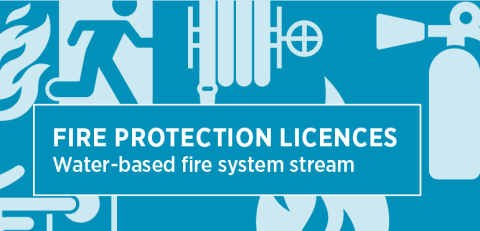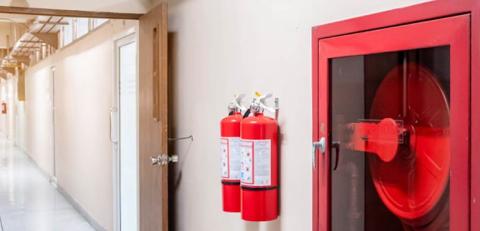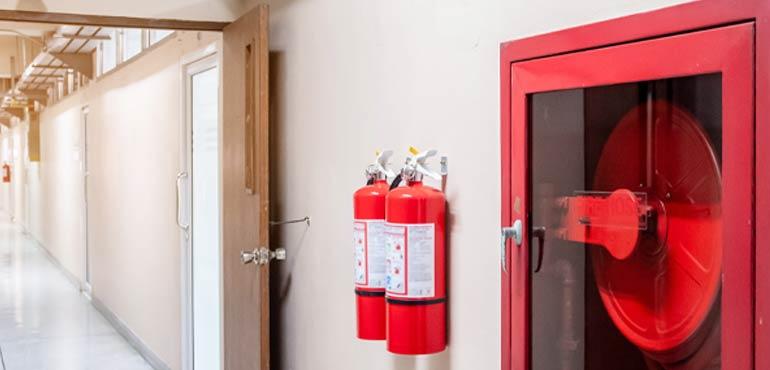
- Home
- Licences
- Licensing reforms
- New fire protection framework
New fire protection licence framework
On 1 May 2021, a new fire protection licensing framework commenced in Queensland.
Overview of new framework
The new framework introduces:
- five specific streams of fire protection licences
- changes of scope of work for transitioning licence classes
- new design classes
- changes to the fire safety professional licence class
- changes to ‘fire protection work’ regulated by the QBCC.
Five new streams of fire protection licences
The new fire protection licensing framework introduces five fire system streams which groups former licence classes with similar functions and types of work.
- passive
- special hazard fire system
- water-based fire system
- portable
- electrical.
In addition, the fire safety professional licence class remains. However the scope of work has changed and there is a need for licensees to hold an appropriate accreditation (unless licensed before 1 May 2021).
See the new licence classes for more details about which licence classes are offered across each of the streams.
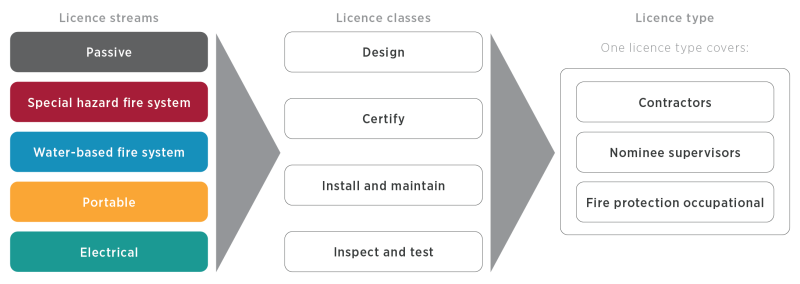
Note: not all classes are available for each stream, refer to summary of the new licences below for more details about which licence classes are offered across each of the streams.
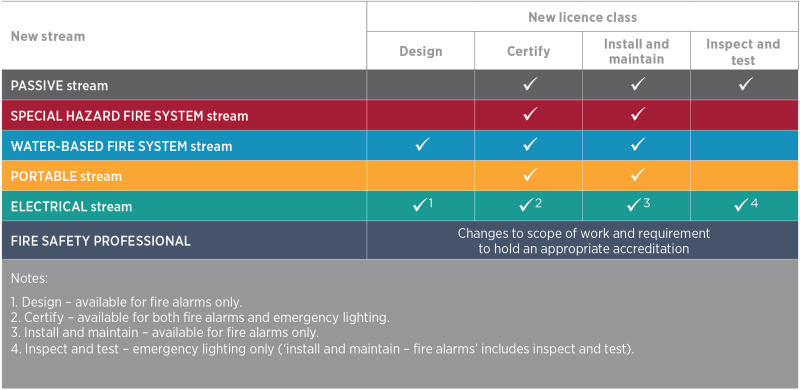
Apply for a new fire protection licence class
Select licence classes from 5 new streams of fire protection work.
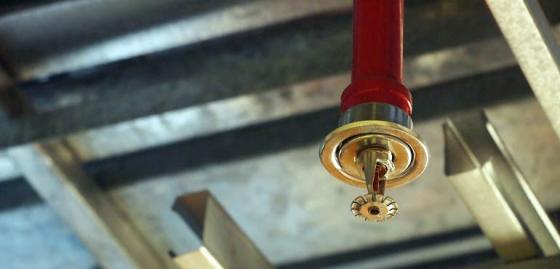
Changes of scope of work for transitioning licence classes
Existing licensees should be aware of changes to their scope of work for some transitioning classes. In some cases, licensees will need to apply for additional licence classes to be able to carry out their current scope of work in full.
New design classes
New licence classes have been introduced to design water-based fire system and fire alarm systems. Additional licence classes have also been introduced for the installation and maintenance of fire and smoke walls. The new licence classes will ensure this work is appropriately regulated and reflects current industry practice.
Changes to the fire safety professional class
The fire safety professional class will be retained. However, the scope of work for the fire safety professional will be amended to restrict this class to conducting inspections and reports on buildings against fire performance legislation.
New licensees will need to hold a relevant accreditation (e.g. with the Australian Institute of Building Surveyors or Royal Institution of Chartered Surveyors), to determine the classes of building they can inspect and report on. Current licensees may continue to inspect and report on all building types.
Changes to ‘fire protection work’ regulated by the QBCC
From 1 May 2021, what is ‘fire protection work’ and ‘fire protection equipment’ has changed. A QBCC fire protection licence will not be required if carrying out any of the below types of work or for work involving the below equipment.
Emergency procedures
Carrying out emergency procedures work is no longer be considered fire protection work and does not require a fire protection licence from 1 May 2021.
Emergency procedures work continues to be governed by the Building Fire Safety Regulation 2008 and more information on emergency procedures can be found at www.qfes.qld.gov.au.
Battery-operated smoke alarms
The installation, repair or maintenance of a battery-operated smoke alarm in a residential (class 1a or 2) building work is no longer be considered fire protection work and does not require a fire protection licence from 1 May 2021.
Fire blankets
Fire blankets is no longer be considered fire protection equipment and work involving fire blankets does not require a fire protection licence from 1 May 2021.
Alternative solutions
The formulation and provision of alternative solutions is no longer be considered fire protection work and does not require a fire protection licence from 1 May 2021.
Changes specific to each former fire protection licence
Most licence classes automatically transitioned to the new relevant licence class following the commencement of a new framework on 1 May 2021.
Find out about specific changes of each former licence class:
- Changes to certify classes
- Changes to emergency lighting licence
- Changes to fire detection, alarm and warning system licences
- Changes to fire hydrants, hose reels and pumps licences
- Changes to fire safety professional licences
- Changes to passive fire licences
- Changes to portable fire equipment licences
- Changes to special hazard suppression systems licences
- Changes to sprinkler and suppression systems licences
- Licensing reforms
- Building Reg Reno
- Fire protection upskilling requirements
-
- New fire protection framework
- Certify classes changes
- Emergency lighting licence changes
- Fire detection, alarm & warning system licence changes
- Sprinkler and suppression systems licence changes
- Fire hydrants, hose reels & pumps licence changes
- Fire safety professional licence changes
- Changes to portable fire equipment licences
- Passive fire licence changes
- Special hazard suppression systems licence changes
